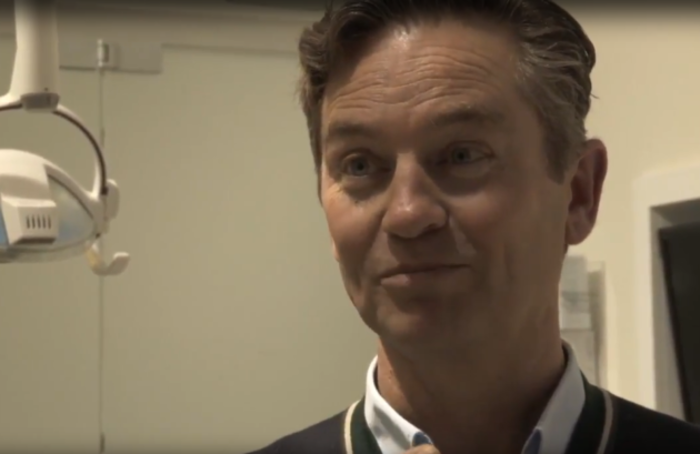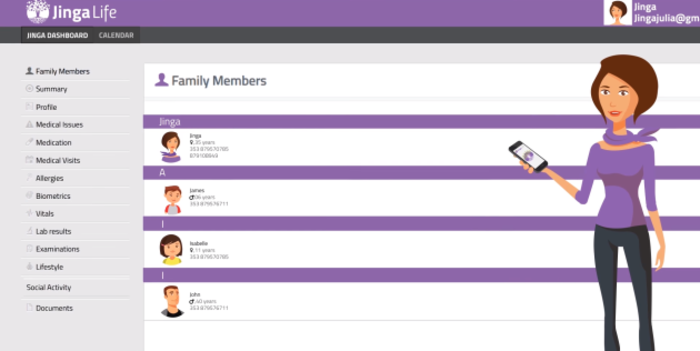This doctor and serial entrepreneur has a plan to get rid of paper medical records
As part of our weekly Startup Spotlight series, we profile Jinga Life.
WHEN DR JOHNNY Walker launched his first startup, his end goal wasn’t to set up an international company – but the second time round, his ambitions are much grander.
Back in 1995, Walker founded Global Diagnostics, a teleradiology system to help him treat an isolated Aboriginal population in Western Australia that he was responsible for at the time.
“It was a little bit naive to be honest,” says Walker. “I rang my boss and he asked how long I reckoned it would take to set up. I thought maybe six weeks, and here we are nearly 22 years later.”
Walker eventually moved the company to Ireland in 2007 to grow it internationally, and the following year the business, which now makes €30 million in revenue, merged with Centric Health.
Nearly four years ago, he exited Global Diagnostics to mentor startups and invest in some early-stage companies while also keeping up his clinical work.
“As Global Diagnostics got bigger and bigger and we went international, people were pushing me to step out of the clinic and go full-time corporate, but that’s not my purpose,” he tells Fora.
“At no stage did I ever want to give up my clinical work because it’s my route into the trenches, which is where the pain points are in medicine. I need to be with the patients to hear their problems.”
It’s through his hands-on work that Walker found his latest startup idea, a digital health record database, Jinga Life, that he works on two days a week while maintaining his schedule as an interventional radiologist at the Hermitage Medical Clinic.
“For the two years after I exited Global Diagnostics, I did a deep dive into the digital personalised mobile health space.
“What I really wanted to do was to stop patients coming to hospitals in the first place and see if we could start delivering healthcare in the home. I don’t think there has been a more compelling time to do this with the technology we have.”
 Dr Johnny Walker
Dr Johnny Walker
The startup, based out of Dún Laoghaire, gets its name from a term to describe an African warrior queen – “a defender and protector of the people”, according to Walker.
“I suppose the most pivotal material observation I had was that when I come out of operating theatre and go into the waiting room, the custodian of care and the curator of the family is usually female,” he says.
“We want to democratise access to the most basic health data, starting with the health record of each and every member of the family.
“And to have it in a format that are medical grade papers that would be coupled to the general practice, pharmacy and hospital. All controlled within the cloud by the chief custodian of care, the Jinga.”
Walker says the company has spent the past three years developing the platform and now has a medical-grade, working model.
He adds that the firm is trying to work out pricing models at the moment, with the system available on a six-month free usage basis until now.
“We’re moving to a subscription model so it will be on a regular monthly returning subscription, in the vicinity of €5 to €10 a month.
“That we will blend all your appointments, medications, allergies and consultations and also includes a 24/7 concierge service from the palm of your hand.”

Funding
A number of high-profile people in Irish business pumped their cash into Jinga Life last year as part of a €1.1 million round of investment.
Some of those angel investors included Hostelworld’s Ray Nolan, CPL’s Anne Heraty and Peter Cosgrove from engineering firm ATA Group.
“I had never taken in external funding, so this time round the base premise has been we will own our own tech. I put in a fair bit of funding myself personally, close to the million-euro mark. But to go on and scale this we decided to open it up,” Walker says.
“It was a very quiet, below-the-radar single email, and these people had already approached and said, ‘Johnny, whenever you do pull the trigger let us know.’”
Walker says the company has enough funding for the next 12 months and the plan is to grow the business by buying new features that can be bolted on to the service, which will likely require a lot of cash.
“The aim of the game is to mobilise a war chest out to €5 million first to ultimately €25 million, €50 million and €100 million,” he said.
“The aspiration is to build a €500 million to €1 billion enterprise, which would allow various exit opportunities for the portfolio investors that would come on at different stages.”
It could all end in tears but, with his experience in the medtech sector, Walker thinks Jinga Life has a competitive advantage.
“There are some big punts being made in digital health, I think $5.2 billion was invested last year, and I think it will be the boulevard of broken dreams for a lot of people.
“A lot of people feel it’s an easy space and a fast-moving stream, but I think there is a degree of domain knowledge that puts at us a competitive advantage.”
This article is part of a weekly series featuring Ireland’s most promising startups. If you would like to see your company featured email news@fora.ie.





